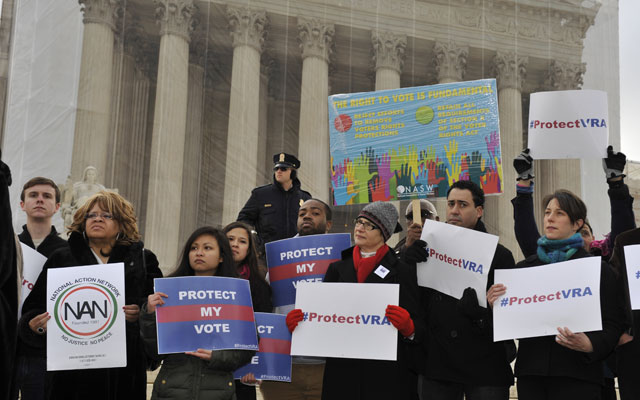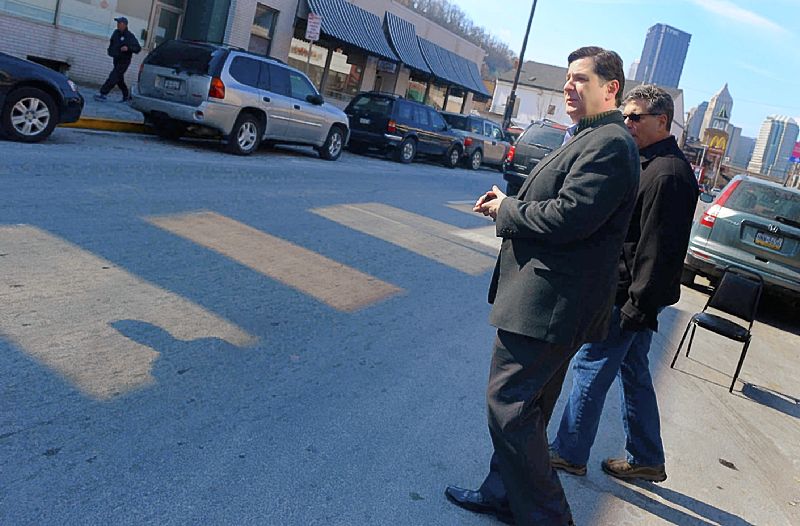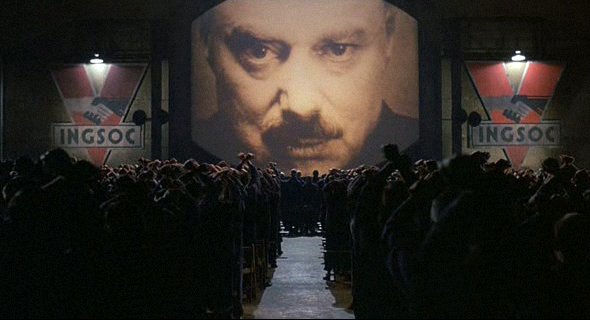A year ago, when Chief Justice John Roberts voted to uphold Obamacare as constitutional, he wrote in the majority opinion that he sees it as the Supreme Court's job to interpret the law as gently as possible--in other words, to err on the side of constitutionality whenever possible and only strike things down when there is no other alternative. As such, they ruled that the Affordable Care Act's insurance mandate was constitutional; not on its own terms, but under the Congress' power to implement taxes--even though that wasn't necessarily the argument its defeners had been making.
I spent the first half of this week assuming today's post would be about DOMA. Before Wednesday I was terrified that the Supreme Court would rule in the other direction and I'd be without a nice, easy topic to write about. But now that I'm here, and this week's events have had a couple days to percolate, I feel like I've already said as much as I need to say about gay marriage and the Defense of Marriage Act. As usual, what little there still is to add was already done quite effectively by Rachel Maddow on Wednesday night, so I'm just going to add a clip below this post that sums up my thoughts.
In the meantime, I'm going to take a page from the John Roberts handbook. Given the title of this blog, I think my own responsibility is to find silver linings wherever possible--rather than just revel in the big thing that everybody likes, I want this blog to highlight the positive aspects of things nobody likes.
Which brings me to that other big ruling this week: the lynching of the Voting Rights Act. Briefly (because I already explained this once), Section 5 of the VRA states that certain areas with a history of discriminatory voting practices (poll taxes, literacy tests, etc) have to clear all future changes to their election laws with the Justice Department. For the last fifty years, "preclearance", as it's called, has been helping to stem the tide of minority voter suppression and ensure that everybody has a seat at the electoral table. The Supremes didn't technically invalidate any of that--all they actually said was that the original formula for determining which states and districts required preclearance was outdated and needed revision--and until such a revision was passed by Congress, the requirement itself was essentially suspended. On its face, that is, well, totally correct. The idea that a particular district should be punished today for laws it passed more than half a century ago is silly. That one of the original preclearance districts is the borough of Brooklyn, I think, says everything.
The problems are twofold: one, many states still are trying to pass discriminatory laws (Voter ID, anyone?) and preclearance was the only thing holding them back; two, making this Congress responsible for fixing the problem is like, well, making Congress responsible for fixing anything--it ain't gonna happen anytime soon.
Make no mistake: I don't like what happened. I would rather have the existing preclearance formula than nothing, and thanks to Tuesday's ruling, what we have for the foreseeable future is indeed nothing. But I'm just not as broken up about it as most of the left, because of the one thing everyone seems to agree on: the Voting Rights Act worked. We are, indeed, living in a different country than we were fifty years ago. The VRA as originally written needed to be enormous, and sweeping, and no-holds-barred, because it was the only thing standing in the way of laws that made Voter ID look like child's play.
But here in 2013, largely thanks to fifty years of the VRA, minority advocates have something they didn't back then: infrastructure. Everybody's been talking about the Voter ID law Texas passed literally hours after the ruling as an example of how the discrimination floodgates are about to open, but you know what? Pennsylvania was never subject to preclearance, and they tried to pass Voter ID here last year--and we stopped it. Resoundingly? No. But the, for lack of a better term, anti-discrimination agenda has enough weight behind it now that it's harder to pass even vaguely discriminatory laws now than it was to pass overtly racist ones in the 60s. And hell, it's not completely impossible that Congress will eventually come up with a new formula that really is better and more effective than the old one.
Maybe it would be easier if the VRA was left alone, but the fact that many on the right talk about "the end of racism" as a cover for continued racism doesn't mean that they're not correct in theory--the goal of the VRA, like with affirmative action, is to speed us along to a place where it's no longer necessary. Sure we're not there yet; maybe we'll never fully get there. But given that the American people will be mostly brown in thirty years no matter what the law says, I'm open to trying a different route for a while.
Further Reading


